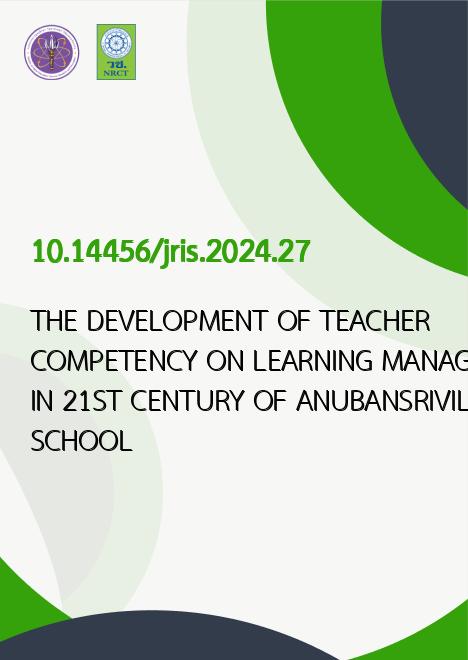
|
THE DEVELOPMENT OF TEACHER COMPETENCY ON LEARNING MANAGEMENT IN 21ST CENTURY OF ANUBANSRIVILAI SCHOOL |
|---|---|
| รหัสดีโอไอ | |
| Creator | Naruewut Chamnanwong |
| Title | THE DEVELOPMENT OF TEACHER COMPETENCY ON LEARNING MANAGEMENT IN 21ST CENTURY OF ANUBANSRIVILAI SCHOOL |
| Publisher | ห้างหุ้นส่วนจำกัด นวัตกรรมการเรียนรู้สร้างสรรค์ |
| Publication Year | 2567 |
| Journal Title | Journal of Research and Innovation for Sustainability (JRIS) |
| Journal Vol. | 1 |
| Journal No. | 7 |
| Page no. | 28-47 |
| Keyword | model development, teacher competency development, learning management in 21st century |
| URL Website | https://so17.tci-thaijo.org/index.php/JRIS |
| Website title | Journal of Research and Innovation for Sustainability |
| ISSN | 3056-9397 |
| Abstract | The objectives of this research were to present a school management model to enhance teachers' competencies in delivering 21st-century learning at Anubansriwilai School. The research was conducted in four phases: Phase 1 involved studying data for developing the school management model to enhance teachers' competencies in delivering 21st-century learning. The target group consisted of 58 teachers from Anubansriwilai School. Phase 2 created the school management model, targeting 11 experts. Phase 3 applied the school management model, targeting 48 primary school teachers from Anubansriwilai School. Phase 4 evaluated the model, targeting educational administrators, school administrators, educational supervisors, and primary school teachers, all selected through purposive sampling. The research tools included questionnaires, semi-structured interviews, tests, and evaluation forms. The statistical analysis used included mean and standard deviation, while qualitative data were analyzed using content analysis. The research findings revealed that: 1. The current situation and the need to develop teacher competence for learning management in the 21st century are at a high level (M= 4.09, SD=0.52; M= 4.48, SD=0.58). 2. The school administration model for developing teacher competence for learning management in the 21st century at Anubansriwilai School has 5 components: 1) Model principles 2) Model objectives 3) Model implementation methods. The steps include: Joint analysis of school context and background information (Context Analysis), building mutual awareness (Awareness and Attempt), developing teacher competence in learning management (Reskills and Upskills), supervision, monitoring and systematic evaluation (Evaluation) and the exchange of knowledge and further development (Development) 4) Evaluation of the model and 5) Conditions for success 3. The results of using the model found that; 1) Teachers had a very high level of relative development scores in knowledge of learning management and the results of the evaluation of satisfaction with the overall model were at the highest level (M= 4.75, SD=0.44). The results of the evaluation of the appropriateness, feasibility and usefulness of the model found that the results of the evaluation in all three aspects were at the highest level (M= 4.58, SD=0.53; M= 4.54, SD=0.54; M= 4.65, SD=0.46). |
